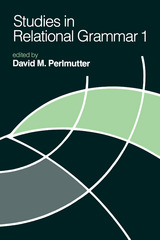2 books about Perlmutter, David M.

Studies in Relational Grammar 1
Edited by David M. Perlmutter
University of Chicago Press, 1983
In this long-awaited book—the first in a three-volume work—David M. Perlmutter has co-authored and edited ten essays that introduce relational grammar, a novel conception of sentence structure that offers far-reaching conclusions for universal grammar.
The basic ideas of relational grammar can be simply stated. First, grammatical relations such as 'subject of,' 'direct object of,' and 'indirect object of,' are needed to characterize the class of grammatical constructions in the clausal syntax of natural languages, to formulate universals of grammar, and to construct adequate and insightful grammars of individual languages. Second, the range of linguistic variation in word order and case patterns makes it impossible to define grammatical relations in terms of phrase structure configurations or case. Rather, grammatical relations must be taken as primitive notions of linguistic theory.
The papers collected here take up the first of these ideas. They lay out the basic theoretical constructs of relational grammar and discuss three areas of grammar—advancement construction, raising, and clause union. In his introduction, Perlmutter discusses each of the papers—most of which are published here for the first time—and places them in the context of the whole of linguistic study.
The basic ideas of relational grammar can be simply stated. First, grammatical relations such as 'subject of,' 'direct object of,' and 'indirect object of,' are needed to characterize the class of grammatical constructions in the clausal syntax of natural languages, to formulate universals of grammar, and to construct adequate and insightful grammars of individual languages. Second, the range of linguistic variation in word order and case patterns makes it impossible to define grammatical relations in terms of phrase structure configurations or case. Rather, grammatical relations must be taken as primitive notions of linguistic theory.
The papers collected here take up the first of these ideas. They lay out the basic theoretical constructs of relational grammar and discuss three areas of grammar—advancement construction, raising, and clause union. In his introduction, Perlmutter discusses each of the papers—most of which are published here for the first time—and places them in the context of the whole of linguistic study.
[more]

Studies in Relational Grammar 2
Edited by David M. Perlmutter and Carol Rosen
University of Chicago Press, 1984
This work and its companion volume, Studies in Relational Grammar 1, introduce the theoretical constructs of relational grammar. This framework is known for its straightforwardness, for its ability to account for exotic data, and for having sparked a wide-ranging, innovative program of research on syntactic universals and typology. Studies in Relational Grammar 2 features analyses of constructions long regarded as anomalous or problematic.
This volume shows how theory and data interact. Ideas such as the Unaccusative Hypothesis and the 1-Advancement Exclusiveness Law have led to new discovering, both cross-linguistic and language-internal, which in turn shed light on such questions as the linkage between semantic roles and initial grammatical relations. New solutions to some long-standing problems follow from relational grammar's restrictive clause-structure typology: impersonal passive is an advancement to subject, antipassive a demotion from subject to direct object, and the "dative subject" phenomenon a demotion to indirect object. These analyses find corroboration in a variety of languages, as do other claims, notably that there exist rules (even of case-marking and verb agreement) that refer to nonfinal grammatical relations. While all these findings bear on the basic problem of syntactic representation, the two opening papers confront that issue directly, arguing that linguistic theory must recognize distinct syntactic levels expressed in terms of grammatical relations.
Relational grammar has brought theory together with data from the most diverse languages. It has significantly expanded the data base syntactic theory must account for and has brought its results to bear on fundamental questions of theory design.
This volume shows how theory and data interact. Ideas such as the Unaccusative Hypothesis and the 1-Advancement Exclusiveness Law have led to new discovering, both cross-linguistic and language-internal, which in turn shed light on such questions as the linkage between semantic roles and initial grammatical relations. New solutions to some long-standing problems follow from relational grammar's restrictive clause-structure typology: impersonal passive is an advancement to subject, antipassive a demotion from subject to direct object, and the "dative subject" phenomenon a demotion to indirect object. These analyses find corroboration in a variety of languages, as do other claims, notably that there exist rules (even of case-marking and verb agreement) that refer to nonfinal grammatical relations. While all these findings bear on the basic problem of syntactic representation, the two opening papers confront that issue directly, arguing that linguistic theory must recognize distinct syntactic levels expressed in terms of grammatical relations.
Relational grammar has brought theory together with data from the most diverse languages. It has significantly expanded the data base syntactic theory must account for and has brought its results to bear on fundamental questions of theory design.
[more]
READERS
Browse our collection.
PUBLISHERS
See BiblioVault's publisher services.
STUDENT SERVICES
Files for college accessibility offices.
UChicago Accessibility Resources
home | accessibility | search | about | contact us
BiblioVault ® 2001 - 2024
The University of Chicago Press









